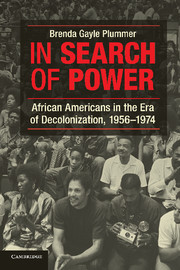Book contents
- Frontmatter
- Contents
- Figures
- Introduction
- 1 A Great Restlessness
- 2 Peace or a Sword?
- 3 “Freedom’s Struggle Crosses Oceans and Mountains”
- 4 Meeting Odinga
- 5 When Race Doesn’t Matter
- 6 Embracing the Globe
- 7 Race, Space, and Displacement
- 8 Africa and Liberation
- 9 Agenda Setting on Two Continents
- Conclusion
- Bibliography
- Index
- References
3 - “Freedom’s Struggle Crosses Oceans and Mountains”
Published online by Cambridge University Press: 05 December 2012
- Frontmatter
- Contents
- Figures
- Introduction
- 1 A Great Restlessness
- 2 Peace or a Sword?
- 3 “Freedom’s Struggle Crosses Oceans and Mountains”
- 4 Meeting Odinga
- 5 When Race Doesn’t Matter
- 6 Embracing the Globe
- 7 Race, Space, and Displacement
- 8 Africa and Liberation
- 9 Agenda Setting on Two Continents
- Conclusion
- Bibliography
- Index
- References
Summary
Pope John XXIII, the fourth of thirteen children born to a family of tenant farmers in rural Italy, on May 15, 1961, issued an encyclical titled Mater et Magistra. Here the pontiff defined the Roman Catholic Church’s position on “Christianity and social progress.” The pastoral benevolence in the document’s tone might seem paternalistic to the contemporary secularist, but the encyclical constituted a critical departure from the church’s decades-long inertia on social and political issues. The Vatican was now responding to the tenor of the times. “There is a … keener interest in world affairs shown by people of average education,” the pope observed. “We are witnessing the break-away from colonialism and the attainment of political independence by the peoples of Asia and Africa.” Changing times required a reaffirmation of Christian values. “The solidarity which binds all men together as members of a common family makes it impossible for wealthy nations to look with indifference upon the hunger, misery and poverty of other nations whose citizens are unable to enjoy even elementary human rights,” Mater et Magistra noted. “Glaring economic and social imbalances” undermine global security.
Pope John XXIII criticized self-interested forms of foreign assistance designed to create dependency and enhance wealthy states’ pursuit of “their own plans for world domination.” Exploitative aid practices “would in fact be introducing a new form of colonialism – cleverly disguised, no doubt, but actually reflecting that older, outdated type from which many nations have recently emerged.” They would “have harmful impact on international relations, and constitute a menace to world peace.” For the Vatican, the “whole raison d’être” of the state was “the realization of the common good in the temporal order.” It identified this goal with a free market and embraced capitalism but rejected materialism of the socialist kind.
- Type
- Chapter
- Information
- In Search of PowerAfrican Americans in the Era of Decolonization, 1956–1974, pp. 97 - 129Publisher: Cambridge University PressPrint publication year: 2012

